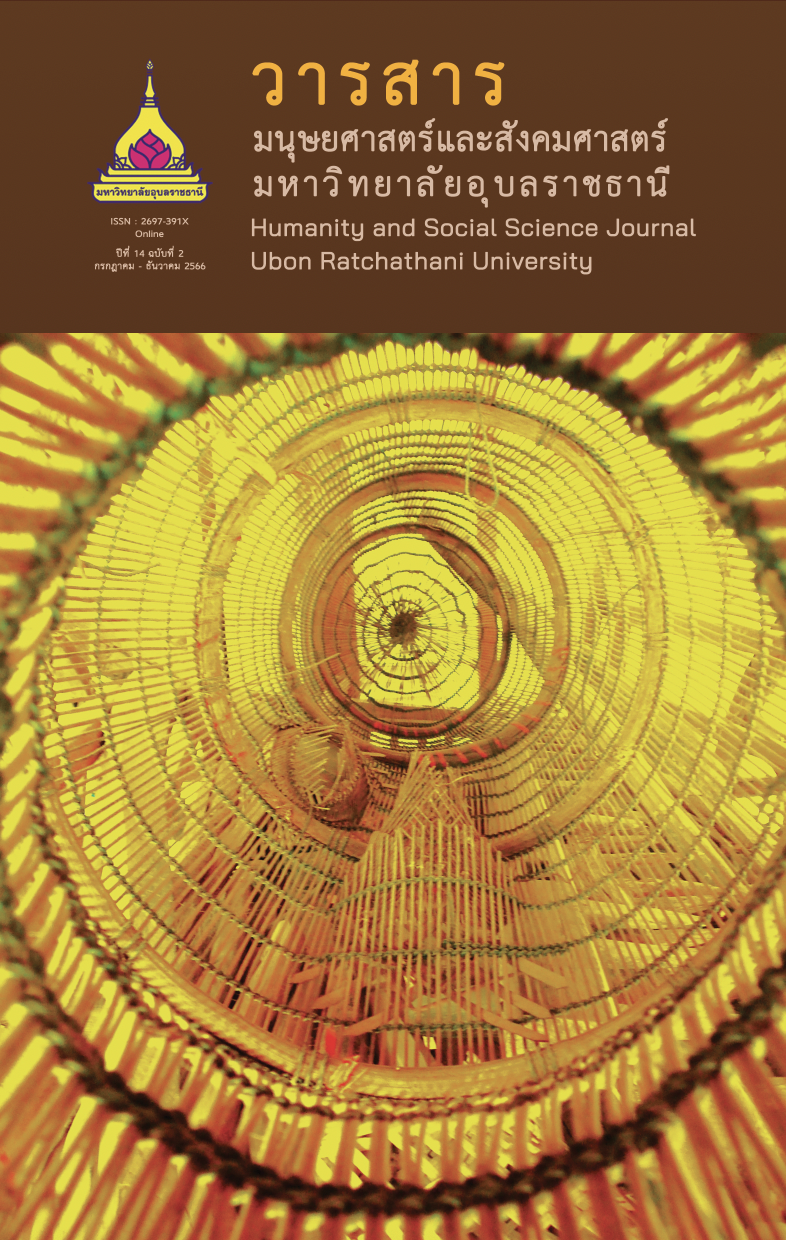การศึกษาอิทธิพลของการเสริมสร้างพลังอำนาจ และความเชื่อประสิทธิภาพในตนของครูที่มีต่อความก้าวหน้าในวิชาชีพครู
Main Article Content
บทคัดย่อ
การวิจัยนี้มีวัตถุประสงค์ เพื่อศึกษาอิทธิพลทางตรงของการเสริมสร้างพลังอำนาจที่มีต่อความก้าวหน้าในวิชาชีพครู และเพื่อศึกษาอิทธิพลทางอ้อมของการเสริมสร้างพลังอำนาจที่มีต่อความก้าวหน้าในวิชาชีพครู ผ่านความเชื่อประสิทธิภาพในตนของครู กลุ่มตัวอย่างในงานวิจัยนี้ คือ ข้าราชการครูในโรงเรียนกลุ่มเครือข่ายไตรรัตน์สัมพันธ์ สังกัดสำนักงานเขตพื้นที่การศึกษาประถมศึกษาปทุมธานี เขต 2 จำนวน 144 คน ได้มาด้วยวิธีการสุ่มตัวอย่างแบบชั้นภูมิ เครื่องมือที่ใช้ในการวิจัย คือ แบบสอบถามมาตรประมาณค่า 5 ระดับของลิเคิร์ทที่มี
ค่าสัมประสิทธิ์แอลฟ่าของครอนบัคของแต่ละตัวแปรมากกว่า 0.7 วิเคราะห์ข้อมูลด้วยสถิติเชิงบรรยาย ได้แก่ ค่าเฉลี่ย ส่วนเบี่ยงเบนมาตรฐาน การวิเคราะห์ค่าสัมประสิทธิ์สหสัมพันธ์ และการวิเคราะห์การถดถอยพหุคูณ ผลการวิจัย พบว่า (1) การเสริมสร้างพลังอำนาจส่งผลทางตรงต่อทัศนคติของครูที่มีต่อความก้าวหน้าในวิชาชีพ และ (2) การเสริมสร้างพลังอำนาจมีอิทธิพลทางอ้อมต่อทัศนคติของครูที่มีต่อความก้าวหน้าในวิชาชีพครู ผ่านความเชื่อประสิทธิภาพในตนของครู
Article Details

อนุญาตภายใต้เงื่อนไข Creative Commons Attribution-NonCommercial-NoDerivatives 4.0 International License.
บทความที่ได้รับการตีพิมพ์เป็นลิขสิทธิ์ของวารสารมนุษยศาสตร์และสังคมศาสตร์ มหาวิทยาลัยอุบลราชธานี
ข้อความที่ปรากฏในบทความแต่ละเรื่องในวารสารวิชาการเล่มนี้เป็นความคิดเห็นส่วนตัวของผู้เขียนแต่ละท่านไม่เกี่ยวข้องกับมหาวิทยาลัยอุบลราชธานี และคณาจารย์ท่านอื่นๆในมหาวิทยาลัยฯ แต่อย่างใด ความรับผิดชอบองค์ประกอบทั้งหมดของบทความแต่ละเรื่องเป็นของผู้เขียนแต่ละท่าน หากมีความผิดพลาดใดๆ ผู้เขียนแต่ละท่านจะรับผิดชอบบทความของตนเองแต่ผู้เดียว
เอกสารอ้างอิง
Bandura, A. (1977). Social learning theory. New Jersey: Prentice-Hall.
Bandura, A. (1993). Perceived self-efficacy in cognitive development and functioning. Educational Psychologist, 28, 117-148.
Bandura, A. (1997). Self-efficacy: The exercise of control. New York: Macmillan.
Bosworth, P. (2022). How to empower employees in the workplace. https://leadershipchoice.com/empower-employees-in-the- workplace/
Equitable Education Fund [EEF]. (2016). Numbers of teachers and administrators in Thailand. https://isee.eef.or.th/screen/ teacherdata/teacher.html
Enderlin-Lampe, S. (2002). Empowerment: Teacher perceptions, aspirations and efficacy. Journal of Instructional Psychology, 29(3), 139-144.
Goens, G. A., & Clover, S. I. R. (1991). Mastering school reform. Massachusetts: Allyn and Bacon.
Hair, J. F., Black, W. C., Babin, B. J., Anderson, R. E. & Andersen, R. E. (2010). Multivariate Data Analysis (Seventh edition). Upper Saddle River, New Jersey: Pearson Education, Inc.
Horadal, P. (1997). Industrial and organizational psychology. Bangkok: Charoen Sin. (in Thai)
Khumjinda, P. (2016). The teacher empowering of administrators in Matthayomthanbinkampangsean School [Master’s Thesis, Silpakorn University]. (in Thai)
Kinlaw. D.C. (1995). The practice of empowerment: Making the most of human competence. United State of America: Gower Publishing Limited.
Maslow, A. H. (1970). Motivation and personality. New York: Harper and Brother.
Nimnouan, S. (2018). The Core Competency Development Affecting to Career Path of Tourism Personnel in Tourism Department, Ministry of Information Culture and Tourism, Lao People’s Democratic Republic. Journal of Interdisciplinary Research: Graduate Studies, 7(1), 138-145. (in Thai)
Raykov, T., & Macoulides, G. A. (2006). A first course in structural equation modeling (2nded.). Mahwah, NJ, US: Lawrence Erlbaum Associates Publishers.
Scott, C. D. & Jaffe, D. T. (1991). Empowerment: Building a committed workforce. California: Koga Page.
Siriparp, T. (2021). Influence of instructional leadership on teacher self-efficacy with collective teacher efficacy as a mediator and teacher role as a moderator [Master’s thesis, Kasetsart University]. (in Thai)
Thanthong, C. (2018). The study teaches' job motivation of Anubanmuangmai Chonburi school under the Chonburi provincial administrative organization [Master’s thesis, Burapha University]. (in Thai)
Tongpetchdaesho, P. & Pongsapitch, C. (2015). Teacher Spirituality and Career Advancement Predicting Job Involvement of Teachers. Journal of Chandrakasem Sarn, 20(40), 79-88. (in Thai)
Zimmerman, M. A. (2000). Empowerment Theory. In: Rappaport, J., Seidman, E. (eds) Handbook of Community Psychology. Springer, Boston, MA.


